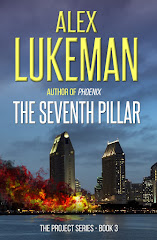Today's post is geared toward writers who want to earn a
living by writing. If you are a writer who writes only for the love of it, a
writer for whom financial return is unimportant, a writer who writes with no
thought of recognition or reward, God bless you. This might not interest you.
I'm not like that.
I write because I really enjoy writing but I also write
because it's the only plan I have after a life spent ignoring things like
"wise retirement planning" and "a well-balanced portfolio".
I never bought into the standard options. I frequently burned the candle at
both ends (yes, a cliché!), which
was almost always interesting, created an eclectic and varied life experience
and took me all over the world. It provided me with material for my writing, since
I've been in a lot of situations most people wouldn't experience. It also left
me without any late life backup except Social Security, and not a lot of that.
Writing is my retirement plan, my 401K, my Golden Parachute, my "portfolio".
What does it take to make a living as a writer? If you are
an independent writer, you have to shoulder the entire process yourself. You
don't have to DO it all. In fact, it's a better idea if you don't "do it
all". But you do have to oversee the process, from the creation of the
manuscript all the way to the marketplace and beyond.
Five years ago, I began White Jade, the first book in the
Project series. Prior to writing fiction I'd had modest success with
non-fiction in the traditional publishing world. Nothing earth shaking, just
some money up front, some hard-bound editions and satisfaction. But it wasn't a
living, not by a long shot.
With the Project series I have reached a point where I can
honestly say I'm "making a living". Not a Stephen King/NFL kind of
living (think of King as the Peyton Manning of popular literature), but enough
to start paying bills. What does it take to do that? I've put together a list
of things that worked for me and could work for you as well. For what it's
worth, here it is:
- Write
a minimum of five days a week. Write at least 1000 words a day.
- Believe
in yourself.
- Either
hire a good editor or REALLY learn how to edit: this is critical.
- Revise
until you want to throw things at the computer. Go away for awhile. Revise
some more. I usually go through 8 or 10 revisions or more. Plus I revise as I
write the draft.
- Believe
in yourself.
- Get a
professional cover. Yeah, it costs a few hundred bucks. It's worth it. See
Joel Friedman's excellent blog, The Book Designer (www.thebookdesigner.com)
- Use
Amazon's KDP Select. I won't go into all the arguments about this program.
It works for me. In my opinion, putting your unknown book on all those
other platforms is a waste of time and energy and is counter-productive. I
tried it; it didn't work. KDP Select gives you the benefit of Amazon's
expertise and it gives you powerful promotional opportunities. It gives
you real time figures. It pays royalties with consistency and provides
statements that are accurate and timely. If you want the best shot at
exposure, KDP Select is the only way to go. Without exposure, your book
will die. Later, if you do well, you can move books off the program and
onto other platforms, if you think it is worth the effort.
- ADVERTISE
- Don't
let critics, writing group members, others, tell you your stuff is no
good. Assume it always needs work. Find someone who can give you honest
feedback. There's room for improvement, but: Believe in yourself.
- Develop
the virtue of PATIENCE. There is no overnight success. I'm fond of Lee
Childs' comment about becoming an "overnight success" after ten
years.
- Writing
is a business. It is essential to
understand this, if you want to make money at it. I admit, it took me a
while to get past my resistance to the reality.
- Believe
in yourself.
Advertising is a big stumbling
block for a lot of people, because ads cost money. The big sites can get very
expensive. Which site, which ad option, that is something each of us has to
determine for him/herself. There are too many variables for a simple answer,
except the basic one: you MUST advertise. You can start with simple $5.00 fees
on sites that list freebies or discounted books. Take a look at www.authormarketingclub.com,
which is free and features a convenient page that lets you submit your book to
a number of sites when it's time to run a promotion. As sales improve, dedicate
a significant part of the revenue to better ad venues. Let the book(s) pay for
themselves.
I could put more info in here, more
advice, but it's all out there if you look for it. For example, understand who
your market is and write for them. Understand what keywords are. Don't try to
be all things to all people. Study Amazon's category system. I highly recommend
a book by David Gaugrahn called Let's Get
Visible. Every self-published author should have this book, along with
Stephen King's memoir On Writing.
You can do it. Go forth and
prosper!











